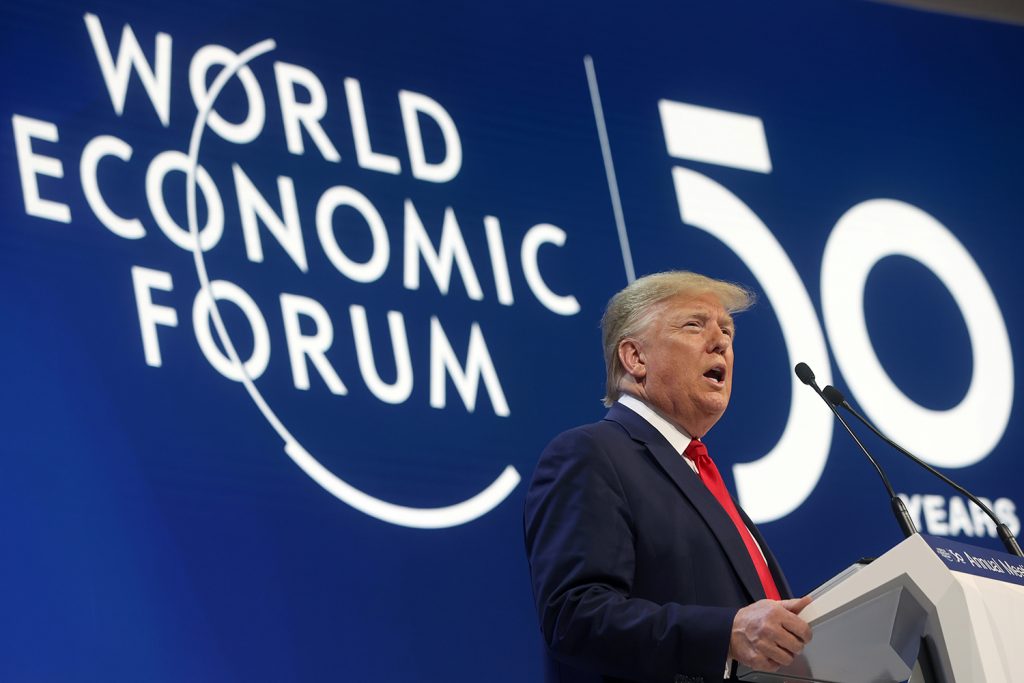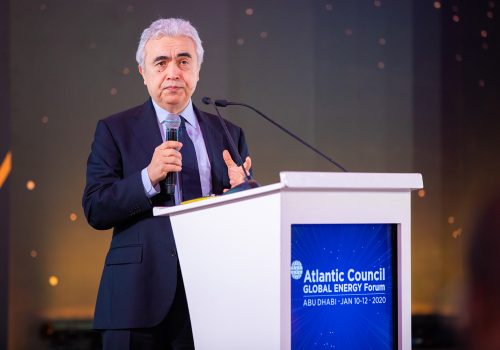US President Donald J. Trump pushed back against criticism that the United States is not doing enough to combat climate change, telling the World Economic Forum in Davos, Switzerland on January 21 that “this is not a time for pessimism, this is a time for optimism. Fear and doubt is not a good thought process.”
As climate activists and protesters around the world call for more concerted international action to address climate change and limiting carbon emissions, Trump argued that “to embrace the possibilities of tomorrow, we must reject the perennial prophets of doom and their predictions of the apocalypse. They are the heirs of yesterday’s foolish profit tellers.”
Despite the United States’ withdrawal from the Paris climate accord, Trump stated that his administration is still “committed to conserving the majesty of God’s creation and the natural beauty of our world,” adding that “the United States has among the cleanest air and drinking water on earth and we are going to keep it that way.” Trump also announced that the United States would be joining the One Trillion Trees Initiative, promising that Washington will “continue to show strong leadership in restoring, growing, and better managing our trees and our forests.” The One Trillion Trees Initiative, launched at the World Economic Forum, aims to organize a global tree-planting campaign to try to counteract increasing carbon emissions.
Trump’s announcement, however, was “only an ambiguous commitment” that was “a mild attempt to excuse or offset business as usual” for US climate policy, Atlantic Council Global Energy Center Deputy Director for Climate and Advanced Energy David Livingston said. Climate activist Greta Thunberg, who also spoke to the crowd in Davos on January 21, said that “planting trees is good of course, but it is nowhere near enough of what is needed and it cannot replace real mitigation and rewilding nature.” She argued that global policymakers must focus on stopping all carbon emissions if there is to be substantial progress in stopping global warming. “We must forget about net zero [emissions],” she said, “we need real zero.”
Trump, on the other hand, celebrated the United States’ transformation from an energy importer to a top energy producer thanks to the utilization of new oil and natural gas reserves. “With US companies and researchers leading the way,” he explained, “we are on the threshold of virtually unlimited reserves of energy, including from traditional fuels, LNG [liquefied natural gas], clean coal, next generation nuclear power, and gas hybrid technologies.”
While “Trump is right [that] this is a time for both optimism and action,” John E. Morton, a nonresident senior fellow with the Atlantic Council’s Global Energy Center, said, Trump “is wrong to suggest that the future lies in fossil fuels.” According to Atlantic Council nonresident senior fellow Phillip Cornell, renewables should be a much bigger focus for the US administration as their “growth rates and cost curves are unmatched by traditional [energy] sources in the United States and around the world.” By emphasizing fossil fuel production, Livingston said, “Trump missed a key opportunity to sell the story of a United States that can still—with the right policies—commercialize zero-carbon technologies as well as any other country in the world.”
While Trump and many policymakers often balk at the potential costs of limiting carbon emissions, according to Morton, “the transition to a global low carbon economy is the most predictable and consequential economic transformation in human history, with tens of millions of jobs at stake. The United States should lead this global transition.” Cornell agreed, saying that since “the fossil fuel industry, and particularly coal, will need more and more subsidies and state support to compete” with renewables, “one might expect a speech focused on economic prowess to boast less about long term dead-end industries.”
According to Livingston, a renewed focus on renewables could be more important to the US economy than the current upswing in fossil fuel production. “The United States is uniquely suited to develop, or co-develop, some of the most critical (and financially lucrative) climate solutions that the global economy will demand over coming decades, from carbon capture to low-carbon fuels to novel solar and hydrogen technologies and beyond.” But the time to lead on this energy transition is now. As Morton warned, “if the United States doesn’t lead, others will.”
David A. Wemer is associate director, editorial at the Atlantic Council. Follow him on Twitter @DavidAWemer.
Further reading:
Image: U.S. President Donald Trump delivers a speech during the 50th World Economic Forum (WEF) annual meeting in Davos, Switzerland, January 21, 2020. REUTERS/Jonathan Ernst



